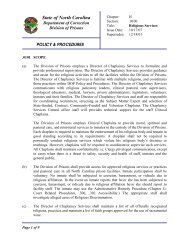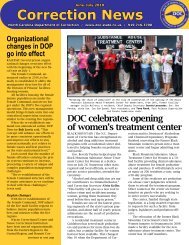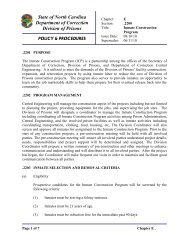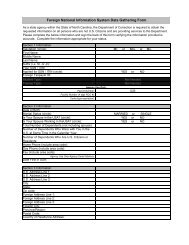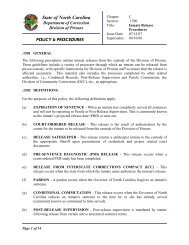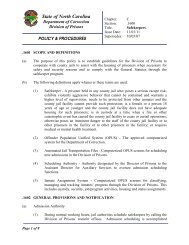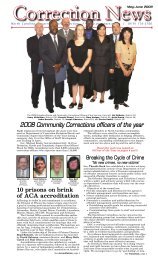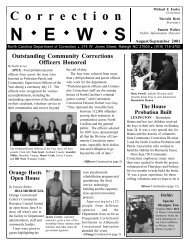Electronic Monitoring - North Carolina Department of Corrections
Electronic Monitoring - North Carolina Department of Corrections
Electronic Monitoring - North Carolina Department of Corrections
You also want an ePaper? Increase the reach of your titles
YUMPU automatically turns print PDFs into web optimized ePapers that Google loves.
NEW OFFENDERS ENROLLED BY MONTH ON GPS FOR FY 2010-2011<br />
Month Mandatory Conditional Total<br />
July 2010 7 11 18<br />
August 6 5 11<br />
September 8 3 11<br />
October 7 3 10<br />
November 4 7 11<br />
December 3 4 15<br />
January 2011 4 5 9<br />
February 9 2 11<br />
March 7 16 23<br />
April 3 4 7<br />
May 7 3 10<br />
June 3 5 8<br />
Totals 68 68 136<br />
The majority (50.7%) <strong>of</strong> <strong>of</strong>fenders enrolled in the electronic monitoring program were<br />
unsupervised <strong>of</strong>fenders (69 <strong>of</strong>fenders). The remaining <strong>of</strong>fenders were supervised (67<br />
<strong>of</strong>fenders). Of the conditional <strong>of</strong>fenders, 14 were Interstate Compact Offenders who were<br />
supervised by our department on behalf <strong>of</strong> another state.<br />
On June 30, 2011 there were 484 <strong>of</strong>fenders enrolled in the electronic monitoring program.<br />
Most <strong>of</strong>fenders (251) were assigned to the mandatory program (satellite based monitoring is<br />
required for the person’s natural life), 233 were assigned to the conditional program<br />
(satellite based monitoring is required for a period <strong>of</strong> time ordered by the court). Of the 484<br />
<strong>of</strong>fenders enrolled, 248 were unsupervised. All <strong>of</strong>fenders enrolled at the end <strong>of</strong> the fiscal<br />
year were monitored via active GPS.<br />
(2) CASELOADS OF PROBATION OFFICERS ASSIGNED TO GPS/SEX<br />
OFFENDER SUPERVISION<br />
Due to the relatively small numbers <strong>of</strong> <strong>of</strong>fenders under GPS supervision, DCC utilized<br />
existing resources to establish specialized <strong>of</strong>ficers in some districts. These <strong>of</strong>ficers specialize<br />
in the supervision <strong>of</strong> sex <strong>of</strong>fenders, including those who do not have the GPS requirements.<br />
Appendix A on pages 7-9 provides information concerning the caseloads <strong>of</strong> <strong>of</strong>ficers<br />
assigned to supervise sex <strong>of</strong>fenders monitored by GPS.<br />
Case management practices differ across the state, requiring many areas to use various types<br />
<strong>of</strong> blended caseloads where <strong>of</strong>fenders <strong>of</strong> different types are combined and managed within a<br />
caseload. Factors such as geography, the number <strong>of</strong> different <strong>of</strong>fender population types and<br />
their admission rates to supervision, and the number <strong>of</strong> <strong>of</strong>ficer resources impact decisions<br />
concerning local case management practices.<br />
3



